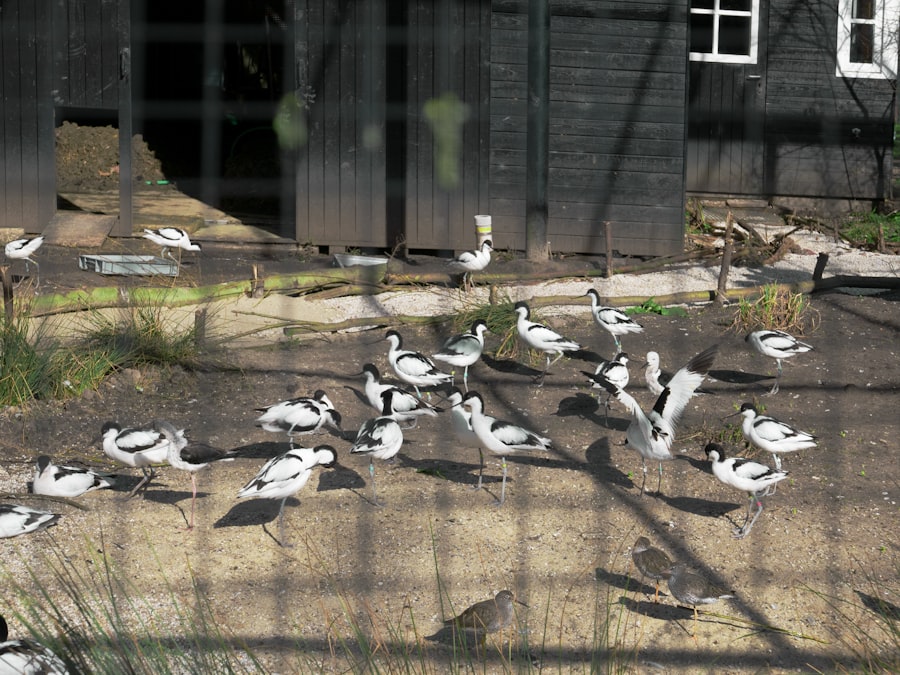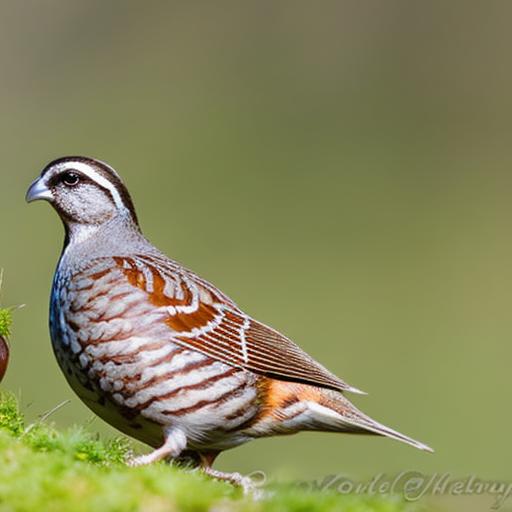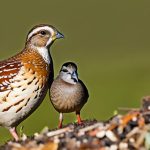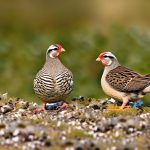Quail are small, ground-dwelling birds that make for unique and interesting pets. They are known for their gentle nature and beautiful plumage, making them a popular choice for bird enthusiasts. There are several species of quail that are commonly kept as pets, including the Japanese quail, the Coturnix quail, and the Bobwhite quail. These birds are relatively easy to care for and can be a great addition to a backyard aviary or even a small indoor enclosure.
Quail are social birds that thrive in small flocks, so it’s important to keep at least a few together to ensure their well-being. They are also known for their gentle and docile nature, making them suitable for families with children. Quail are relatively low-maintenance pets, requiring a clean and safe environment, proper nutrition, and regular veterinary care. With the right care and attention, quail can live up to 5 years in captivity, making them a long-term commitment for pet owners.
Key Takeaways
- Quail make great pets for those with limited space and time, as they are small, low-maintenance birds.
- Quail require a secure enclosure with proper ventilation, bedding, and protection from predators.
- A balanced diet for quail includes a mix of commercial feed, fresh greens, and occasional treats like mealworms.
- Regular health check-ups and access to a qualified avian veterinarian are essential for keeping quail healthy.
- Quail are social birds that thrive in small flocks, and they enjoy dust baths and foraging for food.
Housing and Enclosure Requirements for Quail
When it comes to housing quail, it’s important to provide them with a safe and secure enclosure that meets their specific needs. Quail are ground-dwelling birds that require plenty of space to move around and forage for food. A suitable enclosure for quail should be spacious enough to accommodate their natural behaviors, such as dust bathing and scratching for food. It’s recommended to provide at least 1 square foot of space per bird to ensure they have enough room to move around comfortably.
The enclosure should also be predator-proof to protect the quail from potential threats such as cats, dogs, and other wildlife. This can be achieved by using wire mesh or netting to cover the top and sides of the enclosure. Additionally, the flooring of the enclosure should be covered with a soft bedding material, such as straw or wood shavings, to provide a comfortable and clean surface for the quail to walk on. It’s also important to provide shelter within the enclosure, such as small huts or shelters, where the quail can seek refuge and rest.
Feeding and Nutrition for Quail
Proper nutrition is essential for the health and well-being of pet quail. In the wild, quail are omnivorous birds that feed on a variety of foods, including seeds, insects, and vegetation. As pets, it’s important to provide them with a balanced diet that meets their nutritional needs. A commercial game bird feed is a suitable option for pet quail, as it contains the essential vitamins and minerals they require to stay healthy.
In addition to commercial feed, quail can also be offered a variety of treats and supplements to supplement their diet. This can include fresh fruits and vegetables, mealworms, and grit to aid in digestion. It’s important to provide fresh water at all times, as quail can quickly become dehydrated if they don’t have access to clean water. It’s also important to monitor their food intake and adjust their diet as needed based on their activity level and overall health.
Health and Veterinary Care for Quail
Just like any other pet, quail require regular veterinary care to ensure they remain healthy and free from disease. It’s important to find a veterinarian who has experience working with birds and can provide the necessary care for pet quail. Regular check-ups are essential to monitor their overall health and catch any potential issues early on.
In addition to regular check-ups, it’s important to keep an eye on the quail’s behavior and appearance for any signs of illness or distress. Common signs of illness in quail can include lethargy, loss of appetite, abnormal droppings, or changes in behavior. If any of these signs are observed, it’s important to seek veterinary care immediately to address any potential health concerns.
Quail Behavior and Socialization
Quail are social birds that thrive in small flocks and enjoy the company of their own kind. They are known for their gentle and docile nature, making them suitable for families with children. Quail are relatively low-maintenance pets, requiring a clean and safe environment, proper nutrition, and regular veterinary care. With the right care and attention, quail can live up to 5 years in captivity, making them a long-term commitment for pet owners.
Quail are social birds that thrive in small flocks, so it’s important to keep at least a few together to ensure their well-being. They are also known for their gentle and docile nature, making them suitable for families with children. Quail are relatively low-maintenance pets, requiring a clean and safe environment, proper nutrition, and regular veterinary care. With the right care and attention, quail can live up to 5 years in captivity, making them a long-term commitment for pet owners.
Legal Considerations for Keeping Quail as Pets

Before deciding to keep quail as pets, it’s important to be aware of any legal considerations or restrictions in your area. Some regions may have specific regulations regarding the keeping of quail as pets, including zoning laws, permit requirements, or restrictions on certain species of quail. It’s important to research the local laws and regulations in your area before acquiring quail to ensure you are in compliance with any legal requirements.
In addition to local regulations, it’s also important to consider the ethical implications of keeping quail as pets. It’s important to provide them with a suitable environment that meets their specific needs and allows them to exhibit natural behaviors. This includes providing a spacious enclosure, proper nutrition, and socialization with other quail. It’s also important to consider the long-term commitment of keeping quail as pets, as they can live up to 5 years in captivity.
Tips for Keeping Quail as Happy and Healthy Pets
Keeping quail as pets can be a rewarding experience when done properly. To ensure the happiness and well-being of pet quail, it’s important to provide them with a clean and safe environment that meets their specific needs. This includes providing a spacious enclosure with plenty of room to move around, suitable shelter, and access to fresh water at all times.
It’s also important to provide a balanced diet that meets their nutritional needs and offer plenty of opportunities for socialization with other quail. Additionally, regular veterinary care is essential to monitor their overall health and catch any potential issues early on. By following these tips and providing the necessary care and attention, pet quail can live happy and healthy lives in captivity.
If you’re considering keeping quail as pets, you may also be interested in learning about the best kind of coop for chickens. Poultry Wizard has a helpful article on this topic that can provide valuable insights into creating a comfortable and safe living space for your feathered friends. Check out their article on what kind of coop is best for chickens to ensure that your quail and other poultry have the ideal housing setup.
FAQs
What are quail?
Quail are small ground-dwelling birds that belong to the family Phasianidae. They are known for their distinctive calls and are often found in a variety of habitats, including grasslands, woodlands, and agricultural areas.
Can you keep quail as pets?
Yes, quail can be kept as pets. They are relatively low-maintenance and can be kept in a backyard or small enclosure. However, it’s important to check local regulations and zoning laws before keeping quail as pets, as some areas may have restrictions on keeping poultry.
What do quail eat?
Quail are omnivorous and eat a diet that consists of seeds, insects, and small invertebrates. In a domestic setting, they can be fed a commercial game bird feed or a mixture of seeds and grains.
What kind of housing do quail need?
Quail require a secure enclosure that protects them from predators and provides them with enough space to move around. The enclosure should also have a sheltered area for nesting and roosting.
Do quail need companionship?
Quail are social birds and do best when kept in small groups. It’s recommended to keep at least a few quail together to provide them with companionship and reduce stress.
Are quail noisy?
Quail are known for their distinctive calls, which can be quite loud, especially during the breeding season. It’s important to consider the noise level when keeping quail as pets, especially if you have close neighbors.
Are quail good for beginners as pets?
Quail can be a good option for beginners as pets, as they are relatively easy to care for and can thrive in a backyard or small enclosure. However, it’s important to do thorough research and understand their specific needs before getting quail as pets.
Meet Walter, the feathered-friend fanatic of Florida! Nestled in the sunshine state, Walter struts through life with his feathered companions, clucking his way to happiness. With a coop that’s fancier than a five-star hotel, he’s the Don Juan of the chicken world. When he’s not teaching his hens to do the cha-cha, you’ll find him in a heated debate with his prized rooster, Sir Clucks-a-Lot. Walter’s poultry passion is no yolk; he’s the sunny-side-up guy you never knew you needed in your flock of friends!







